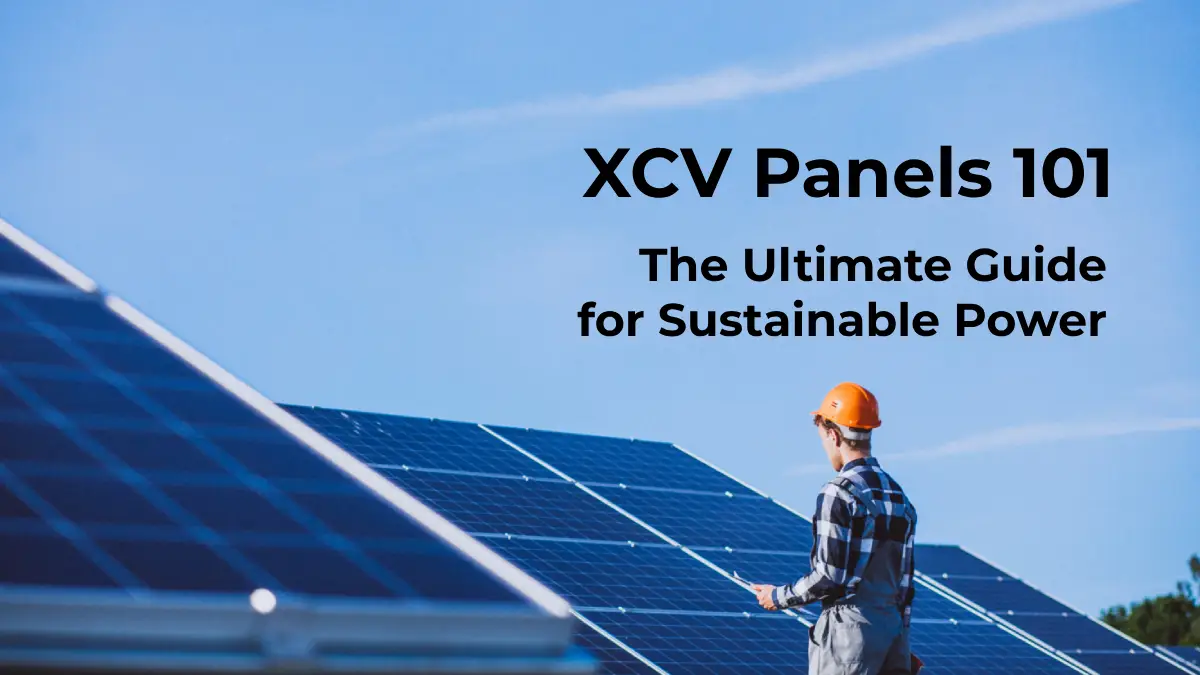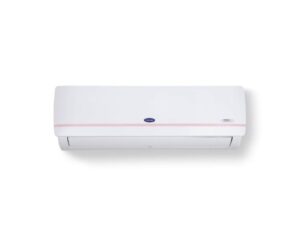Introduction
Are you ready to unlock a sustainable energy revolution? Imagine a world where your home or business doesn’t just consume energy but generates its power. That’s precisely what XCV panels bring to the table.
You might be wondering what an XCV panel is exactly. These innovative marvels harness the power of the sun, transforming it into clean, reliable electricity.
Welcome to the world of XCV Panels, where cutting-edge technology meets sustainability!
In this section, we’ll embark on a journey to explore the wonders of XCV Panels, understanding their significance in our quest for renewable energy and how they address our growing energy needs.
1. Overview of XCV Panel
- Cutting-Edge Solar Technology: The XCV Panel represents the forefront of solar technology, offering advanced features and capabilities in harnessing renewable energy.
2. Importance of Renewable Energy
- Mitigating Environmental Impact: The importance of renewable energy, such as solar power, lies in its capacity to mitigate environmental impact. It provides a sustainable alternative to traditional, finite resources, reducing our ecological footprint.
3. Purpose of the XCV Panel in Addressing Energy Needs
- Meeting Growing Demands: The purpose of the XCV Panel is to address the increasing global energy needs. By efficiently converting sunlight into electricity, these panels play a pivotal role in providing a sustainable and reliable energy source for diverse applications.
What is an XCV Panel?
1. Definition and Abbreviation Breakdown
- Defining XCV: XCV Panel, short for Expandable Converting Voltage Panel (XCV), is a revolutionary solar technology designed to efficiently harness sunlight and convert it into electrical power.
2. Description of XCV Panel’s Composition
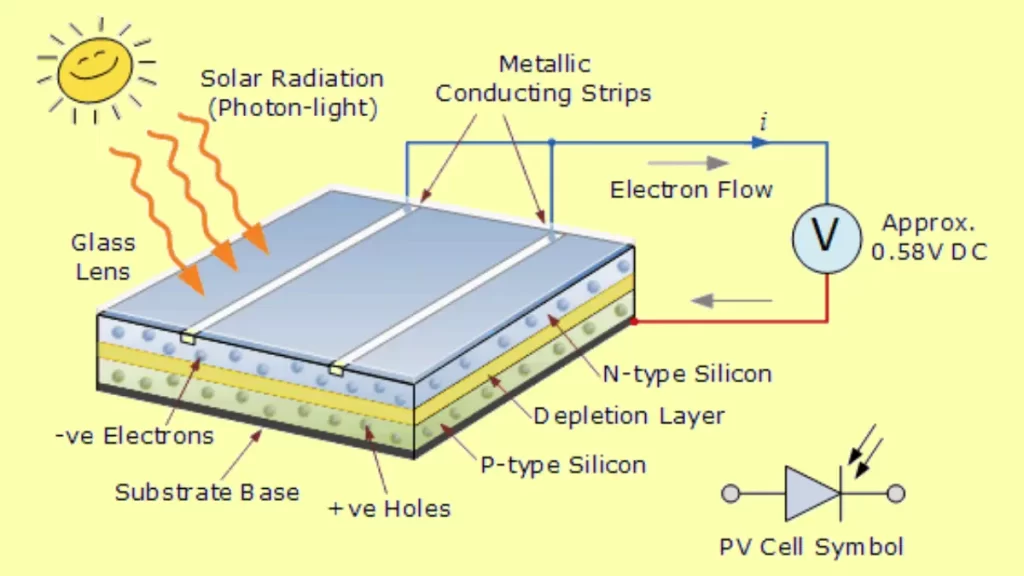
- Advanced Components: The advanced components of the XCV Panel include high-performance photovoltaic cells, a durable frame made from lightweight yet sturdy materials such as aluminum alloy, and an intelligent energy conversion system that incorporates the latest power electronics and control technologies. These components work synergistically to enhance the panel’s efficiency, durability, and overall performance in converting sunlight into electricity.
3. Functionality of XCV Panel
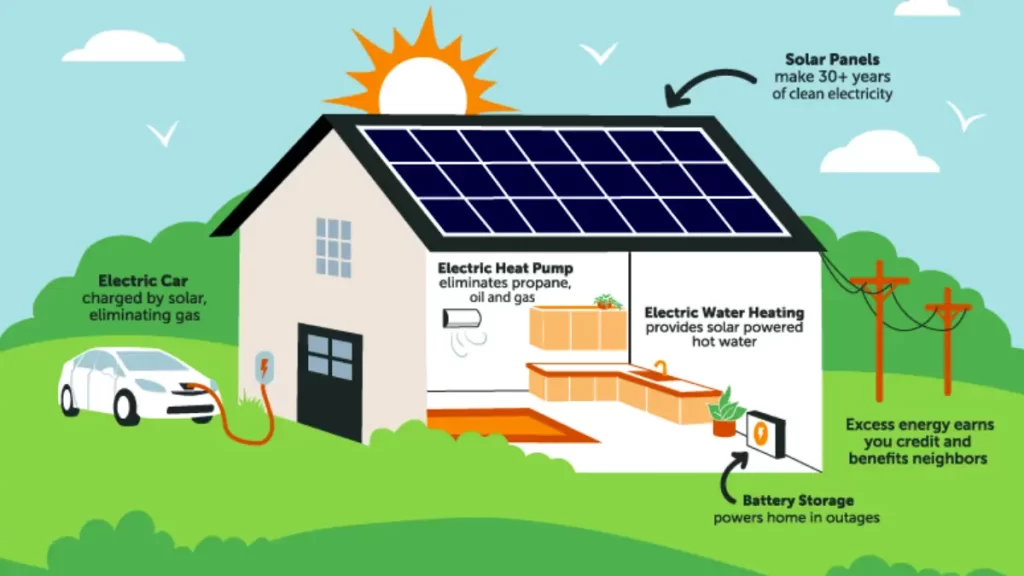
- Efficient Solar Conversion: The XCV Panel converts sunlight into electricity using advanced photovoltaic cells. These cells absorb sunlight, generating electrons and producing electric current. The panel’s efficient energy conversion system maximizes this process, making it a reliable source of clean energy.
Features and Benefits
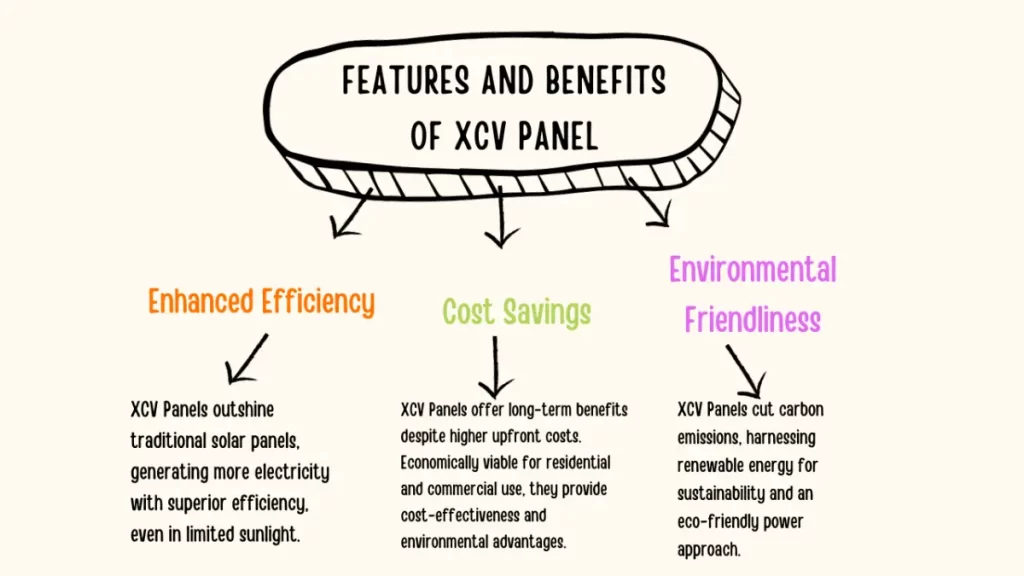
1. Enhanced Efficiency
- Comparison with traditional solar panels
XCV Panels outperform traditional solar panels by converting sunlight into electricity more efficiently. This means they can generate more power with the same amount of sunlight, making them a superior choice for harnessing solar energy. - Ability to generate power with limited sunlight
Unlike conventional solar panels, XCV Panels excel in generating power even in conditions with limited sunlight. Their advanced technology allows them to capture and convert sunlight more effectively, ensuring a reliable power supply even in less-than-ideal weather.
2. Cost Savings
- Initial costs vs. long-term benefits
While XCV Panels may have higher initial costs, the long-term benefits outweigh the upfront investment. The efficiency and durability of XCV Panels lead to substantial savings over time, making them a financially sound choice for those considering sustainable energy solutions. - Economic viability for residential and commercial applications
XCV Panels prove economically viable for both residential and commercial applications. Their cost-effectiveness, coupled with long-term savings, makes them an attractive option for individuals and businesses looking to reduce energy expenses while contributing to a greener environment.
3. Environmental Friendliness
- Reduction in carbon dioxide emissions
XCV Panels play a crucial role in reducing carbon dioxide emissions. By relying on solar power, they contribute to a cleaner energy ecosystem, helping mitigate the environmental impact associated with traditional energy sources that release harmful pollutants. - Contribution to a sustainable environment
Embracing XCV Panels aligns with sustainable practices. These panels promote the use of a clean, renewable energy source, reducing dependence on finite resources and fostering a more sustainable and eco-friendly approach to power generation.
Applications of XCV Panel
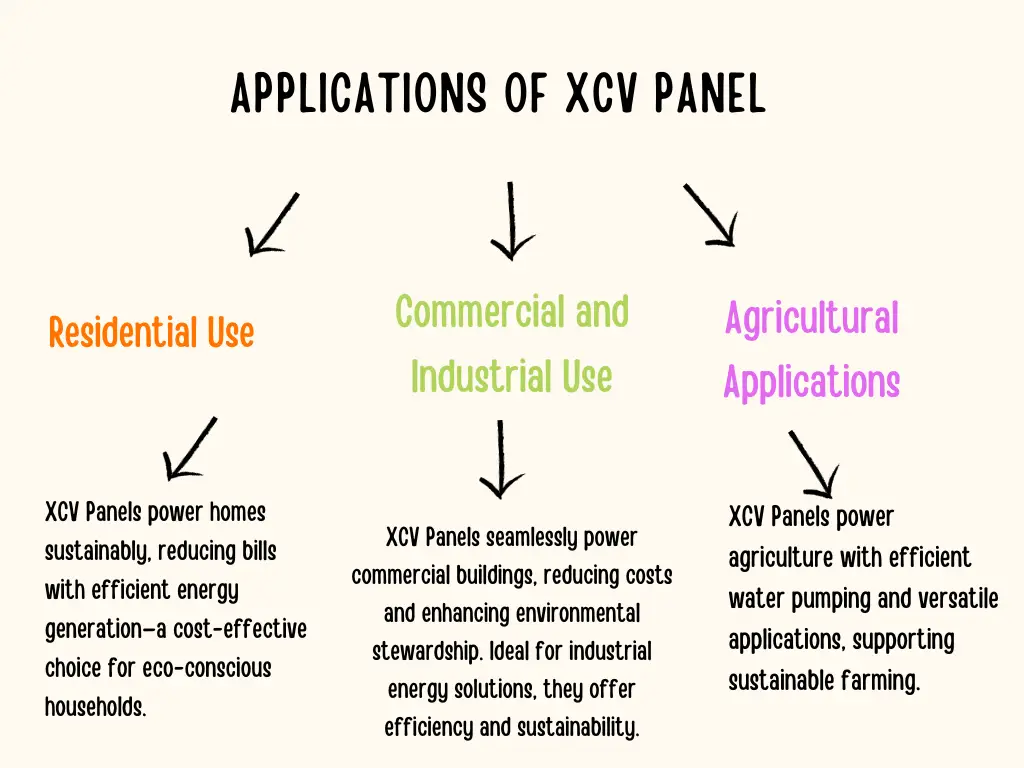
1. Residential Use
- Powering homes with solar energy
XCV Panels are designed for residential applications, providing an efficient and sustainable way to power homes using solar energy. Homeowners can harness the sun’s power to meet their energy needs, leading to reduced reliance on traditional grid systems. - Cost-effective solutions for households
XCV Panels offer cost-effective solutions for households by reducing electricity bills over time. Their ability to generate power efficiently makes them an attractive option for homeowners seeking sustainable and economical energy sources.
2. Commercial and Industrial Use
- Integration into commercial buildings
XCV Panels seamlessly integrate into commercial buildings, offering a reliable and environmentally friendly energy source. This integration not only reduces operational costs but also aligns businesses with sustainable practices, enhancing their overall environmental stewardship. - Advantages of industrial energy solutions
XCV Panels are advantageous for industries to include in their energy solutions. The advanced technology and efficiency of these panels make them suitable for industrial applications, contributing to reduced energy costs and a more sustainable approach to power consumption.
3. Agricultural Applications
- Water pumping methods in agriculture
XCV Panels find practical use in agriculture by powering water pumping systems. This application enhances irrigation methods, providing a sustainable and energy-efficient solution for farmers to manage water resources effectively. - Versatility of XCV Panels in various contexts
XCV Panels showcase versatility in various agricultural contexts, from providing energy for equipment to supporting sustainable farming practices. Their adaptability makes them a valuable asset in addressing diverse energy needs within the agricultural sector.
XCV Panels vs. Traditional Panels
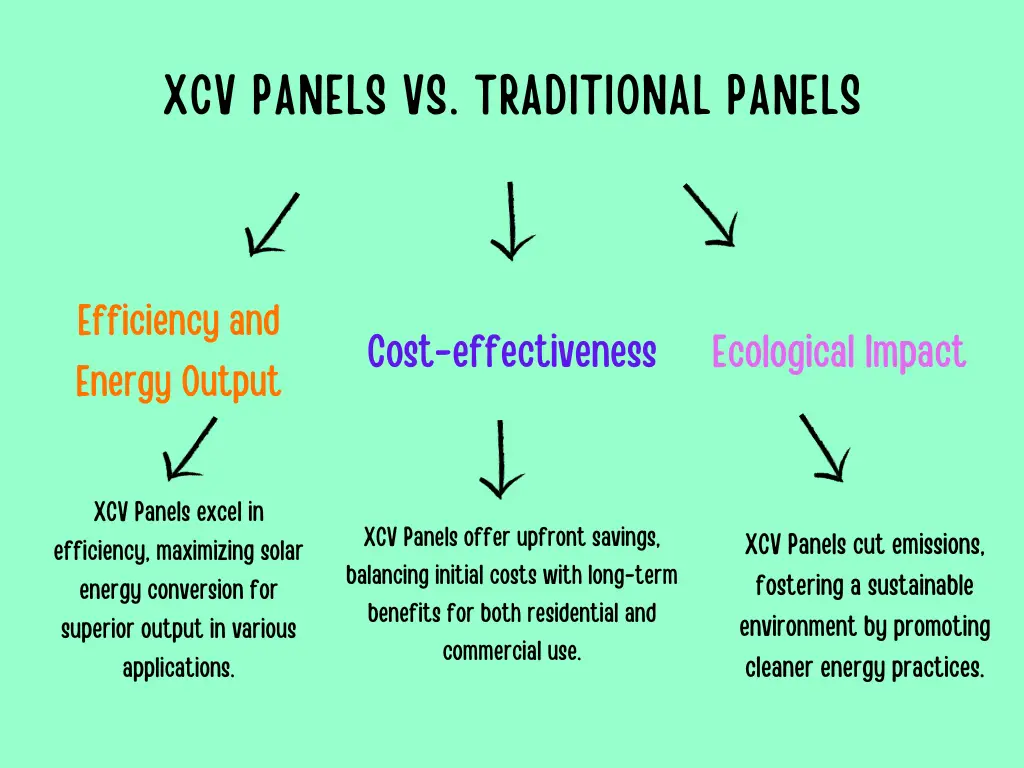
1. Efficiency and Energy Output
- Efficiency: XCV Panels outperform traditional panels in efficiency, maximizing energy output from sunlight. The advanced technology ensures a higher conversion rate, making them a more effective choice for capturing solar energy.
- Energy Output: XCV Panels demonstrate superior energy output compared to traditional panels. This increased output translates to a more reliable and productive source of solar energy for residential, commercial, and industrial applications.
2. Cost-effectiveness
- Initial Costs vs. Long-term Benefits: While XCV Panels may have slightly higher initial costs, their long-term benefits outweigh the initial investment. The cost-effectiveness comes from reduced energy bills and the longevity of the panels, providing substantial savings over time.
- Economic Viability for Residential and Commercial Applications: XCV Panels prove economically viable for both residential and commercial applications. The overall cost-effectiveness makes them an attractive choice for those looking to invest in sustainable and efficient energy solutions.
3. Ecological Impact
- Reduction in Carbon Emissions: XCV Panels contribute significantly to the reduction of carbon dioxide emissions. Their eco-friendly design and efficient energy production play a crucial role in mitigating the environmental impact associated with traditional energy sources.
- Contribution to a Sustainable Environment: Choosing XCV Panels over traditional options aligns with sustainability goals. Their ecological benefits extend beyond reduced emissions, promoting a cleaner and more sustainable environment.
Choosing the Right XCV Panel
1. Considerations for Selection
- Energy Needs: Evaluate your specific energy requirements to determine the right XCV Panel capacity. Understanding your energy needs ensures optimal performance and efficiency.
- Location and Environmental Factors: Consider the geographical location and environmental conditions where the panels will be installed. Factors like sunlight exposure and climate play a crucial role in panel performance.
- Budget Considerations: Assess your budget constraints and weigh them against the long-term benefits. Understanding the financial aspects helps in choosing a cost-effective solution that aligns with your budgetary requirements.
2. Expert Advice for Decision Making
Seeking expert advice is essential when deciding on XCV Panels. Professionals can provide valuable insights into the selection process, considering technical aspects, installation requirements, and long-term performance. Their expertise ensures informed decision-making for optimal results.
Installation and Maintenance
1. Importance of Professional Installation
- Professional Installation Importance: Opting for professional installation is crucial for the optimal performance and longevity of XCV Panels. Professionals make sure the panels are fitted appropriately to maximize their dependability and effectiveness.
2. Regular Maintenance for Optimal Performance
- Maintenance for Performance: Regular maintenance is essential to uphold optimal panel performance. Scheduled inspections, cleaning, and minor repairs by professionals help extend the lifespan and efficiency of XCV Panels.
Cost Considerations
1. Initial Costs
- Initial Investment: XCV Panels may have a higher initial cost, but this investment pays off in the long run. The initial costs cover advanced technology and durable materials that contribute to the panels’ efficiency and longevity.
2. Long-term Financial Benefits
- Savings Over Time: While there might be a higher upfront cost, XCV Panels offer substantial long-term financial benefits. Reduced energy bills, government incentives, and extended panel lifespan contribute to significant savings over the life of the system.
XCV Panels and Energy Efficiency
1. Role in Reducing Dependency on Traditional Power Sources
- Reducing Dependency: XCV Panels play a pivotal role in reducing reliance on traditional power sources. They reduce reliance on non-renewable resources by using solar energy to create a more diverse and sustainable energy mix.
2. Contribution to Eco-friendly Lifestyles
- Promoting Eco-friendly Lifestyles: Choosing XCV Panels aligns with eco-friendly living. The panels generate clean energy, minimizing environmental impact and promoting a sustainable lifestyle.
3. Impact on Monthly Energy Costs
- Monthly Savings: XCV Panels have a direct impact on monthly energy costs by generating electricity from a free and renewable source—sunlight. This results in reduced reliance on grid power, translating into consistent monthly savings for users.
Environmental Impact
1. Role in Lowering Carbon Emissions
- Reducing Carbon Footprint: XCV Panels significantly contribute to lowering carbon emissions. By harnessing clean and renewable solar energy, they help mitigate the environmental impact associated with traditional energy sources.
2. Limiting Environmental Damage Caused by Fossil Fuels
- Fossil Fuel Mitigation: XCV Panels play a crucial role in limiting environmental damage caused by fossil fuels. As they reduce the reliance on non-renewable energy, they contribute to preserving ecosystems and minimizing pollution.
Future Trends in XCV Panels
1. Ongoing Research and Development
- Continuous Innovation: Ongoing research and development are driving continuous innovation in XCV Panels. Scientists and engineers are striving to improve price, durability, and efficiency so that next-generation solar panels stay at the forefront of environmentally friendly technology.
2. Improvements in Efficiency and Affordability
- Enhanced Performance: Future trends in XCV Panels focus on improving efficiency and affordability. Anticipate advancements that make solar energy an even more viable and cost-effective option for a broader range of users.
3. Increased Accessibility to a Wider Audience
- Wider Adoption: The future holds increased accessibility to XCV Panels for a wider audience. Technological advancements and streamlined manufacturing processes will make these panels more available, promoting broader adoption across various sectors.
Alternatives to XCV Panels
1. Sun Power
- Alternative Option: Sun Power is a notable alternative to XCV Panels. It offers efficient solar solutions with a focus on sustainability.
2. LG
- Technology Competitor: LG presents an alternative with advanced solar technology, providing options for those exploring alternatives to XCV Panels.
3. REC Solar
- Solar Innovation: REC Solar is another player in solar innovation, offering alternatives with distinct features and capabilities.
4. Solar Edge
- Inverter Solutions: Solar Edge specializes in inverters, providing an alternative approach to harnessing solar energy.
5. Enphase Energy
- Microinverter Technology: Enphase Energy offers microinverter technology as an alternative solution for solar energy utilization.
Conclusion
In conclusion, XCV Panels stand at the forefront of renewable energy innovation.
Their revolutionary approach to capturing solar energy brings tangible benefits in efficiency, cost-effectiveness, and environmental impact.
Looking ahead, ongoing research promises even greater efficiency, affordability, and accessibility.
From residential to industrial applications, XCV Panels showcase remarkable versatility.
They offer a balanced solution for budget considerations, combining upfront costs with long-term savings.
The positive environmental impact, coupled with long-term financial benefits, positions XCV Panels as a smart choice for a sustainable energy future.
Beyond financial considerations, XCV Panels play a crucial role in reducing dependency on traditional power sources, fostering eco-friendly lifestyles, and positively impacting monthly energy costs.
Their environmental benefits extend to limiting damage caused by fossil fuels, contributing to broader environmental conservation and sustainability goals.
In essence, XCV Panels embody a transformative force, paving the way for a more efficient, cost-effective, and sustainable energy landscape.
Embrace the potential of XCV Panels and contribute to a more vibrant and eco-friendly future.
Frequently Asked Questions (FAQs) about XCV Panels
1. What is the XCV Panel?
The XCV Panel is an advanced solar panel designed to convert sunlight into electricity efficiently. It utilizes cutting-edge technology for enhanced performance.
2. How does it differ from traditional solar panels?
XCV Panels boast higher efficiency, increased energy output, and a more eco-friendly footprint compared to traditional solar panels.
3. What are the key benefits of XCV Panels?
Enhanced efficiency, substantial cost savings over time, and a positive impact on the environment through reduced carbon emissions are among the key benefits.
4. Are XCV Panels suitable for residential use?
Yes, XCV Panels are designed for residential applications, offering an eco-friendly and cost-effective solution for powering homes.
5. Can XCV Panels be integrated into commercial buildings?
Absolutely. XCV Panels are versatile and can be seamlessly integrated into commercial and industrial structures, providing sustainable energy solutions.
6. How do XCV Panels contribute to environmental sustainability?
XCV Panels play a significant role in lowering carbon emissions and limiting environmental damage caused by fossil fuels, promoting a sustainable environment.
7. What factors should I consider when choosing an XCV Panel?
Consider your energy needs, location, environmental factors, and budget when selecting an XCV Panel. Expert advice can also aid decision-making.
8. Is professional installation necessary for XCV Panels?
Yes, professional installation is crucial to ensure optimal performance. Regular maintenance is also recommended for long-term benefits.
9. What is the expected lifespan of XCV Panels?
XCV Panels typically have a long lifespan, often exceeding 25 years, making them a durable and reliable investment.
10. Are there alternatives to XCV Panels?
Yes, alternatives include Sun Power, LG, REC Solar, Solar Edge, and Enphase Energy. Each has its unique features and advantages.

